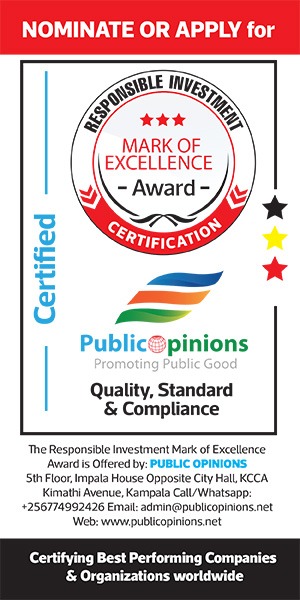 World Bank Uganda is a winner of the 2015 Uganda Sustainable Development Award and accredited Uganda’s Top50 Sustainable Development Agencies in recognition and appreciation of its enormous contribution towards social-economic development of Uganda and attainment of the United Nations Sustainable Development Goals in Uganda. Awarded and Accredited by Public Opinions International
World Bank Uganda is a winner of the 2015 Uganda Sustainable Development Award and accredited Uganda’s Top50 Sustainable Development Agencies in recognition and appreciation of its enormous contribution towards social-economic development of Uganda and attainment of the United Nations Sustainable Development Goals in Uganda. Awarded and Accredited by Public Opinions International
Worlld Bank has been involved in support Infrustructual development p[rojects in Uganda hence contributing towards social-economic transformation of Uganda.

Starting in the late 1980s, the Uganda government has pursued a series of stabilization and pro-market structural reforms. The resultant macroeconomic stability, post-conflict rebound, and investment response generated a sustained period of high growth during 1987-2010. Real gross domestic product (GDP) growth averaged 7% per year in the 1990s and the 2000s, placing Uganda among the 15fastest growing economies in the World.
However, over the past decade, the country witnessed more economic volatility and the growth in gross domestic product (GDP) slowed to an average of just about 5%. With the population increasing at a rate of at least 3% per annum through these decades, per capita income growth decelerated from a rate of 3.6% recorded in the decades of 1990s and 2002, to about 2%. Going forward, takeoff of a huge public investment program and resumption of private sector economic activity in the post-election era is expected to drive growth. This notwithstanding, the effects of a volatile global economy on demand for Uganda’s exports and timing of key infrastructure projects in the country’s oil sector, could offset any benefits of improved terms of trade due to low oil prices. Under these circumstances, the Ugandan economy is forecast to grow at a rate of approximately 5.9% in FY16/17. Growth will increase to 6.8% in FY17/18, and thereafter stay on an upward trajectory into the medium term, if major infrastructure projects are implemented as planned, and private investment intensifies with oil-related activities.
Political Context
President Yoweri Kaguta Museveni was re-elected for another five-year term defeating seven challengers in elections held on February 18, 2016. The incumbent, has been in power since 1986 after a five year military conflict. President Museveni’s prolonged stay in power is a result of the constitutional amendments approved by a referendum in July 2005. The amendments introduced multi-partyism and led to Parliament lifting the two, five-year presidential term limits, which allowed President Museveni to seek a third term in office during the elections in 2006.
For about 20 years of Museveni’s rule, the country faced an insurgency in the north and earlier sporadic skirmishes in the eastern part of the country. Today, the whole country has been pacified and is largely peaceful, however, numerous challenges are keeping the country from attaining full democratic progress, including corruption, underdeveloped democratic institutions, and human rights related abuses.
Development Challenges
Uganda surpassed the Millennium Development Goals (MDGs)target on halving poverty by 2015, and made significant progress in reducing the population that suffers from hunger, promoting gender equality and empowering women. But a large proportion of its population is highly vulnerable to falling back into poverty, making achievements of the twin goals a challenge. With almost half of its people under the age of 15 years (one of the world’s youngest populations) and a fertility rate estimated at 5.7 children per woman (2015), Uganda has a very high dependency ration and population growth that generates 700,000 new labor market entrants every year. Achieving good livelihood would entail overcoming challenges, such as low levels of productivity of both agricultural and non-agricultural sectors; inappropriate urban development; the slow development of infrastructure; and the limited availability of credit. Moreover, the persistently high rates of poverty in the Northern region pose a challenge reducing regional inequality.
World Bank Uganda
Rwenzori House
1 Lumumba Avenue
P.O. Box 4463
Kampala, Uganda
+256 414 230 094
Awarded and Accredited by;
Public Opinions International
P.o Box 35297 Kampala-Uganda
Tel:+256701992426
Web:www.pubopinions.org


















